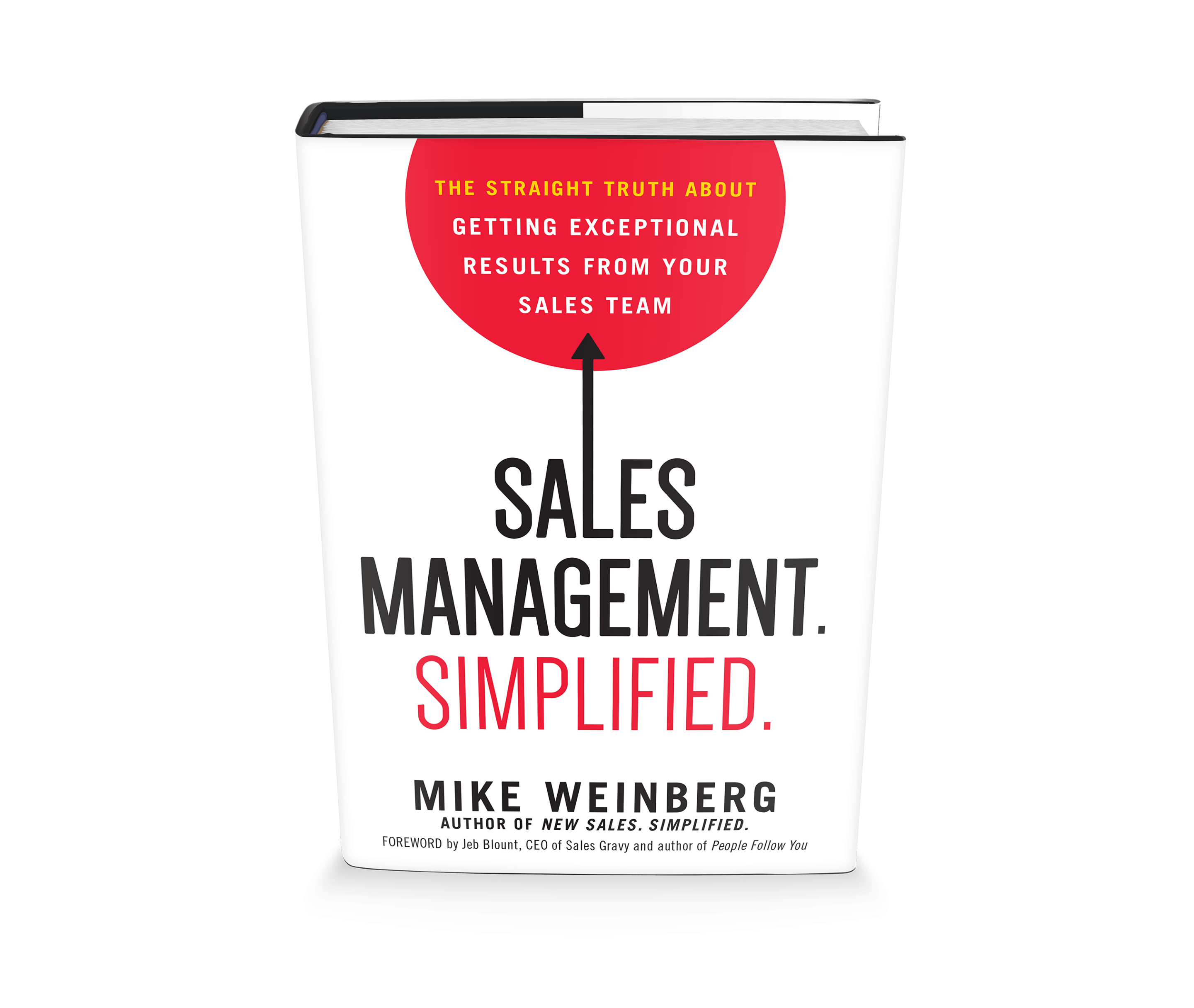
There are many sales books that help develop selling skills and provide inspiration. Few, however, focus entirely on sales management and Mike Weinberg’s latest book, Sales Management. Simplified., does just that.
Packed with actionable advice and hard-earned sales wisdom, the book reminds its readers to go back to the basics of sales management and focus on what really matters – leadership. Ultimately, the book is a common sense prescription for building and managing high performance sales teams, with no silver bullets, short-cuts, or fads – it’s blunt and reinforces the idea that less is more.
Peak Sales Recruiting’s CEO and Co-founder Eliot Burdett caught up with Mike to discuss what effective sales leadership means, causes of sales team underperformance, sales compensation as a motivational tool, and, of course, sales recruiting.
Mike, what was your inspiration for writing Sales Management. Simplified.?
I did not want to write this book, I felt compelled to write it. I was tired of being called into companies by senior executives to fix their “sales problems”, only to discover that it was a leadership problem. It was out of utter exasperation and frustration with senior executives, who don’t understand sales management or bury sales managers in all kinds of crap, that I felt like I had to write this book. I was compelled by the various messes sales managers and executives often found themselves in.
When I first got into consulting, I was young and naive and thought if I coached everyone to sell like me that I could transform sales performance and change companies, but, I was wrong. I learned the hard way that you do not transform sales organizations from the bottom by training and coaching enough sales people; you have to deal with leadership and culture. If you do not deal with these two things then you do not transform anything. As a result, I felt like I had to get my frustrations off my chest and write this book.
Eliot: I always joke that when I was younger I made every mistake in the book and then some. If most people who read your book are like me, it will take them back to their early years and cause laughter and probably some cringing. I love the stories you go through including the different influential people you’ve met and the experiences you’ve been in. I liked your saying “as goes the leader so goes the organization”, the level of a sales team rarely ever exceeds the level of the sales leader. It really is a powerful quote.
I was mentored by some really great people, and one of the favourite expressions I came across was: “If it’s broken at the top then it’s broken and the team will never do better than the leader.” As most sales leaders spend their time living in reactive mode, cleaning up messes, sitting in corporate meetings, and doing everything but high value activities, they ultimately model that same behavior for their sales people. People ignore the fact that sales managers or executives of small companies are key leverage points for growing sales. Too often, time and money is spent training salespeople but none is spent on upgrading the sales leader – no wonder why executives are routinely frustrated with the sales team.
“If it’s broken at the top then it’s broken and the team will never do better than the leader.”
The book is a model for how organizations can overachieve and drive continual sales performance. What would you say are the top causes of inferior sales performance and team under performance?
My first book has a chapter dedicated to the ‘not-so-sweet’ 16 reasons salespeople underperform: they can’t tell the story, they live in reactive mode, they babysit their existing customers, they don’t run good sales calls and, they don’t know the customer’s calendars.
Due to the popularity of that chapter, I decided to dedicate the entirety of Part One of Sales Management. Simplified. to laying out the leadership reasons that sales teams underperform. That’s why Part One is so brutal; it’s very transparent about the challenges sales leaders are facing today.
It’s packed with stories about real executives, managers, and companies who have been struggling to drive revenue. Now, there are a ton of reasons as to why sales teams underperform, but, if I had to give you a couple, I’ll start with the big ones: 1) The one size fits all approach to sales talent management and sales compensation. 2) The reality that sales managers across verticals are being distracted and diverted from their primary job because the company buries them with the wrong activities and does not truly understand what the sales leader should be doing.
Sales compensation is a huge issue, and as you can imagine it plays a large role in enticing people to make a career change. In spite of some of the popular research that would argue otherwise, our experience tells us that great sales people rank it right up at the top of their list when deciding whether or not to listen to a new opportunity. So let’s start there – what are the top issues with sales comp plans today?
I think there are a couple of big issues. Generally, these issues arise because the compensation plan does not drive the desired behaviors and results that executives want them to. It boils down to the two big compensation plans sins: 1) The plan is too flat, meaning there is very little difference from what top and bottom producers earn. 2) Compensation plans are not structured correctly to motivate reps to perform the right activities and behaviors that drive sales results.
Let’s start with the first issue – comp plans being too flat. Unfortunately, plans like these accomplish the exact opposite of what compensation plans should. Executives and senior sales leaders should be overcompensating their best people – this is assuming that their behavior drives results and not just care-taking a territory that was going to produce whether they got up in the morning or not. And since there is such a shortage of “A” players, the last thing sales leaders want to do is have one of their top producers question whether they are appreciated; so the goal should always be to overpay top people for what they produce, and create a discomfort for those who are underperforming because they should be hungry, uncomfortable, and embarrassed. The goal shouldn’t be for underperforming salespeople to live on what they’re taking home if they are not producing – the compensation plan should be structured to force a change in behavior to drive better results, or force the rep to quit and go fail somewhere else.
So when there is not a big enough earning delta between the top and bottom, you cause the best people to think about leaving which is the last thing sales leaders want.
“the goal should always be to overpay top people for what they produce, and create a discomfort for those who are underperforming”
Eliot: Do you think that some of these compensation plans are an intentional effort to create equity across the sales team?
That’s a brilliant question but I really don’t know. I think that there are some politically correct, egalitarian people designing comp plans that prefer when everything is the same because they don’t understand sales. The unfortunate reality is that not enough thinking goes into how the plan is designed, and how powerful it can be.
I see a lot of plans that don’t move ‘the needle’. Plans should incent the rep to behave a certain way and a lot of plans fail to do that. For example, let’s look at commission. Commission is only commission when it is earned and, unfortunately, a lot of times commission is in name only.
A few years back I had a client where a big part of their revenue was a consumable product. New reps would only have to do the hard work to find a large buyer of the consumable, then for years and years rely entirely on the revenue derived from this customer to hit their sales number. The truth is that if the customer was having a great year and production levels were good, whether that salesperson did anything or not, he or she was going to earn a fat commission check since that company kept buying the consumables. A compensation plan like this creates a big disincentive to sell; it gives the sales rep no reason to move ‘the needle’ if they can get away with doing nothing but babysit customers.
The second point that needs to be made about effective sales compensation is that a dollar is not a dollar when it comes to commission. I have no idea why so many companies pay the same commission rate for a sale to a customer that was acquired years ago – which only requires salespeople to babysit that account – and the same rate to the salesperson who puts in the hard work to acquire a new customer. The logical question sales leaders need to ask themselves when structuring their commission plans is: Why would my rep go the distance to do the hard work of hunting, when they can babysit and get fat, dumb, and rich off their client base?
I’m not saying to not serve existing customers, but why would anyone want to do the hard work when it does not pay any more money? The challenge for sales leaders is to think of this problem at the simplest level: What would happen if they overpaid for new business and, over time, reduced the commission to provide incentive for reps to hunt so they could not reap the rewards off the new customer and be forced to go out and find new business?
Eliot: I couldn’t agree more. At Peak, we see a surprisingly high number of comp plans that are overly simplistic and appear to have been an afterthought in terms of their ability to drive sales results. Surprisingly, there are often eureka moments when we walk through comp plans with our customers and they realize that their comp plans don’t necessarily incent the desired results.
I tell this story in the book. I was getting ready to talk to a group of about 15 business owners that met once a month. I was putting a PowerPoint slide together about compensation and complacency and I typed in compensation and complacency into the slide and it hit me like a ton of bricks: they start with the same 4 letters! Nobody ever talks about that but if you have complacent sales people you should start to look at your compensation plan. This is as blatant of a tie-in as it gets, and yet so many executives don’t want to go there – they don’t want the hassle or HR risks.
Let’s talk about the one size fits all approach to sales recruiting and hiring:
We were all made differently; we all have different DNA – some of us are wired to kill, care, be detail oriented, problem solve, and/or manage. It is rare to find all those gifts and talents in one person, and yet at so many companies have oversimplified the sales role where one person does everything. My argument is that this approach creates a very miserable average.
The best story I can give you is from my own career. I was the #1 person selling 3-4 more times than what other salespeople were because my manager looked at me and said, “you’re a good hunter but you’re pretty awful at this whole project management thing. You’re one of the few guys that knows how to go out and actively acquire a new customer, so we’re going to put an incredible team of support people around you. These people will strictly manage the ongoing customer relationships so that you can spend 80% of your time hunting – not 20%.”
So, if sales leaders were to take a rep who’s wired like a hunter and quadruple the amount of time they could spend prospecting, making friends, getting on airplanes, doing inside or outbound sales, what do you think would happen to results? What would happen if the sales leader took the very few good hunters they had and freed them up to do what they’re best at?
Now everyone likes to talk about hunters and farmers, but I talk about hunters and zookeepers. You have people who are wired like zookeepers – they love to nurse the baby animal, pet them, feed them, clean the cage, and spend time nurturing the animals. What if you tell that person that they spend too much time with animals? What if you were to go on and ask them to go pick up a rock and go kill an animal out in the field? People with these instincts do not succeed at these tasks for a simple reason – they hate it. They are not wired like that. They hate the conflict, they hate the risk, and they don’t want to pick up a weapon and kill. They are nurturing, caring, supportive, and do an awesome job when you give them the opportunity to care for the animal.
So imagine if executives actually took the time to properly evaluate their sales team’s DNA and assigned people to tasks that they were gifted at. When that happens, everyone wins – the sales person wins and the company wins since they operate in their area strengths.
What would happen if the sales leader took the very few good hunters they had and freed them up to do what they’re best at?
Eliot: The majority of the projects that we would take on are for hunter roles. Companies come to us because it is very difficult to find individuals that possess that specific skill set AND have an incredible track record in selling. We are very familiar with the DNA of that person and how different it is from a farmer, or as you call it, a zookeeper. You don’t have to spend a long time in sales to be able to determine whose DNA is more for nurturing relationships, as opposed to the hunter who needs to kill to feel that adrenaline. Try putting the zookeeper at desk and ask them to make cold calls… it’s like they have broken arms – they just won’t do it. It’s something that we see a lot and is a huge challenge for companies and sales leaders with aggressive sales targets.
That’s why Peak Sales Recruiting is so important – recruiting great sales talent is no easy task and it takes specific expertise to recruit the best. In fact, I just finished with a local client and we needed a hunter to join the sales team. I told them that they needed a search firm. They/we needed a firm that was going to do the job right, because there are no unemployed good hunters – they are incredibly rare. My client needed someone who understands recruiting, and how to find and attract a candidate who is not actively looking for new opportunities. I’m a huge fan of search and recruiting when done properly because there is nothing more important than getting the right talent, particularly when the requirements are so specific.
While we are on this line, you said that there is a sales talent shortage and you talked about the ratio between ‘A players’ versus ‘non A players’ on a sales team. Can you speak about why great hunters are so rare?

So maybe it’s always been a certain percentage of hunters that were always ‘on top’, but I don’t know that sales leaders really understood the difference between reps when things were good and everybody had enough business. So when things got bad, the smoke finally cleared and the contrast between the good, great, and bad sales people became blatantly obvious.
There is a lot of truth to what you are saying. So how can companies do a better job at attracting the right sales people?
When recruiting, you promote the fact that you have a healthy, pro-sales culture. You promote the fact that the company has a leader who wants each member of the sales team to be successful, and who is more interested in making others a hero instead of being ‘the’ hero. You also promote the fact that there is a great comp plan that is structured to reward people for great performance. I mean, let’s be honest, that’s the reason that most people leave their jobs: they don’t like the plan, manager, or culture. Culture is huge; you cannot overstate the power of a pro-sales culture versus an anti-sales culture.
Why is sales culture so powerful?
Because it is the ingrained behaviors and attitudes of the whole sales organization, it flows down from the top, and is almost impossible to change. Unless you change the people, you cannot change the culture.
In my early career, I only worked in healthy pro-sales cultures. I did not know there were things such as an anti-sales culture until I went to work at a little tech company and discovered that my life was very bad. They did not understand sales, the emotion of a salesperson, and the environments where salespeople work well and excel. It took a few consulting engagements on my own to realize that a healthy sales culture is more rare than I ever imagined. There are a couple different chapters in the book that unpack the elements of an unhealthy sales culture, and in one chapter in the second half of the book, I take the time to describe this one company that had the single most healthiest culture that I have ever seen.
So if i’m running my company or sales team and thinking that I have to make sure we have a pro-sales culture, what are the top 3 things I have to make sure I’m doing?

As sales people read this article or my book, they applaud because they are thankful that I would say this. So part of the sales culture problem is the guy at the top is clueless; he’s an ego manic and needs to let go. It is the biggest destroyer of sales morale you can imagine. So, the biggest factor in a great sales culture is having an executive that is pro sales and who is committed to helping the sales team. He or she needs to invest the time mentoring the sales manager to spend time on the right things. At the end of the day, it is the executive who changes everything!
“part of the sales culture problem is the guy at the top is clueless; he’s an ego manic and needs to let go.”
So how should the sales manager/leader spend his or her time to create the sales culture that everyone wants? I would argue that the 3 most powerful ways to create a pro-sales culture and a high performing sales team are 1) The manager needs to meet one-on-one with his or her people regularly. Accountability and coaching meetings are absolutely critical and it’s usually not happening enough! 2) Conduct productive sales team meetings. Too many meetings are about operations and have nothing to do with sales, and the sales people are often permitted to show up late and with bad attitudes. 3) The sales manager has to get out from behind their desk and stop living with their head buried in the CRM screen and in spreadsheets. They also need to stop managing people by email. They need to get out of their office and sit with the sales team, and spend time with their team on the front lines.
Effective sales managers debrief after visiting with prospects to discuss what the sales rep did well and what could be done differently to be more effective next time. The best sales managers focus on the results of their reps and ensure they hold them accountable. They are committed to coaching their reps on the skills required to penetrate accounts and close deals.
In your book, you outline the format for effective one-on-one meetings and sales team meetings. What are the elements sales leaders need to focus on?
Instead of talking about nonsense, leaders need to start with results – what was added to the pipeline and what was moved? Then, talk about activities if the results aren’t there. Sales leaders really have no choice but to ask about activities if their reps aren’t producing. And, I don’t take credit for this, but my old sales manager and my good friend, Donnie Williams, modeled that for me when I worked for him and it was the best thing that I have ever seen. He would come to my office, go through my sales results and ask why they weren’t better. And if they were not stellar then we would look at my pipeline and he would ask why I did not close certain prospects. He would ask targeted questions about my approach, and ask what I had in store for the upcoming month and remainder of the quarter. So, the formula for effective one-on-one sales meetings is simple: Focus on results, then pipeline, then activity. Nobody can accuse a manager of being a micromanager if you start with results, pipeline, and activity levels since nobody wants to be asked how they manage their time.
“the formula for effective one-on-one sales meetings is simple: Focus on results, then pipeline, then activity.”
You mention mentors and their impact on your selling career. Talk a bit about the importance of mentoring from a sales context.

Imagine if a newly married couple had an older couple with a healthy marriage around. A couple that they could watch to see how they interacted with each other and how they live life. Imagine the benefits the couple would realize; it would be huge! It’s the same thing in business. What’s sad is in the name of being lean, so many companies have decided that everyone should do three jobs, which is why so many sales managers are dying. Companies today are making the sales manager do so many other things that have nothing to do with sales leadership, like conducting product reviews or being apart of meetings that sales really has no business participating in. At the end of the day, the sales leader can’t even breath – they have 250 emails to return and don’t have time to mentor anybody. But when they get yelled at for unreturned emails, what do you think they’re going to be spending their time doing?
One of the things you mentioned is that the best mentors hold their reps accountable. Do you come across organizations that tolerate perennial underperformance from their sales people? Why is that a problem?
Not a lot, but enough. If you let a rep who’s not delivering stay around for forever, then you’re missing out on results that someone else could be delivering. The other issue is that you damage the sales culture by communicating to everyone else on the team that it is okay to fail here.
Unfortunately, I’m often brought into companies that have ‘niceness’ issues – they’re a family business, they have no turnover, the ownership is generous… now don’t get me wrong, these are great aspects, however, sometimes the leaders of these companies act like more of a charity than a business. So when I have to get a point across to a president, I’ll ask how many months in a row they would you let their controller be late with financial statements and tolerate them being inaccurate. Everyone of them says “I need accurate financials every month. I’d have zero patience for this.” OK, so you have no tolerance for under performance from your accounting department, so how come these six sales people out of your 12 have never hit their goal and they still work here?! They aren’t on a plan and nobody’s coaching them up or out and the executive never has an answer for that. Why is it OK for your salespeople to fail and not the accountants?
The argument I would make is that everyone else’s livelihood in the company is dependent on very few salespeople doing their jobs because nobody else creates revenue. It is exactly the reason why companies need to only recruit top performers. I am the last guy that wants to fire people and I’ve lost sleep over it since letting people go is hard. But, if you are managing people like I talked about in the book, and you have one-on-one meetings, and you’re clear on goals and results, and you publish sales results for the entire team to see, the rep shouldn’t be surprised when they are called out for missing their number. The sales manager needs to frame that conversation in a certain way – something like: “Hey Joe, you know why we are having this conversation – your results are not acceptable. Right now I am going to help you put a plan together to change that. We have 60 days to turn this around and we cannot keep you here if this is the level you are going to produce.”
I talk in the book how to remediate and coach up/out an underperformer, that is, if you think that they’re a keeper. This requires a lot of energy from sales managers and, in fact, I have a client right now that I’m instructing on how to coach up a rep who has not been hitting targets. They’ll know in 60 days whether or not the rep is up to the task. Having this type of conversation with a rep is not an emotional kind of conversation, it is a legitimate business conversation. Unfortunately a lot of managers don’t want to deal with it and put it off until its too late, and then they have perennial failure.
There is a concept in your book about the professional vs amateur sales manager. What is the difference between the two?
Think about amateur salespeople. Amateur salespeople are not coached, so, the same logic applies to sales managers. You see a ton of new sales managers making it up as they go because they have no idea what good sales management looks like since they grew up in an era where nobody showed them. Once CRM systems and email became popular, a lot of sales management best practices were thrown out the window, which is why you could call this book ‘old school’. Once sales managers put the principles found in Sales Management Simplified into practice, they realize the benefits of sticking to the basics and keeping it ‘old school’.
Peak Sales Recruiting would like to formally thank Mike Weinberg for taking the time to share his unique insights on effective sales management. Click here to learn more about Sales Management. Simplified. or if you are interested in purchasing the book, and we recommend that all sales managers do, click here.
About Mike:

Mike had been the top-producing salesperson is three organizations.
Forbes, OpenView and several other publications have named Mike a Top Sales Influencer.
Mike is also the author of two Amazon #1 Bestsellers. His first book, “New Sales. Simplified.” – The Essential Handbook for Prospecting and New Business Development, spent a full year as the Top-Rated book in its category. And his latest book, Sales Management. Simplified. is being called “arguably the greatest book ever written on sales management, and an unequaled blueprint for leading salespeople and building high-performance sales teams.”
relpost-thumb-wrapper
close relpost-thumb-wrapper
Eliot Burdett
Eliot received his B. Comm. from Carleton University and has been honored as a Top 40 Under 40 Award winner.
He co-authored Sales Recruiting 2.0, How to Find Top Performing Sales People, Fast and provides regular insights on sales team management and hiring on the Peak Sales Recruiting Blog.
Latest posts by Eliot Burdett (see all)
- 20 Of Our Favorite Books About Sales Management and Sales Leadership – October 20, 2023
- How To Make Progress On Your Sales Goal Without A Sales Leader – September 15, 2021
- Augment Your Recruiting Strategy During “The Great Resignation” – July 26, 2021




